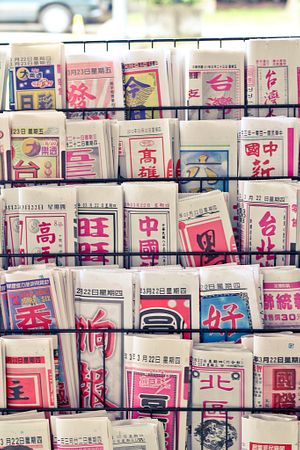The Paris-based NGO Reporters Without Borders (RSF) has released its annual World Press Freedom Index, which ranks 180 countries according to “an evaluation of pluralism, independence of the media, quality of legislative framework and safety of journalists.” The 2018 report was overall a pessimistic one, with RSF noting in its summary that “[h]ostility towards the media from political leaders is no longer limited to authoritarian countries.”
There were some bright spots, however, one of which is Taiwan.
Taiwan placed 42nd out of 180 countries, making it the highest-ranking country in East Asia, just ahead of South Korea at 43rd. That’s not an aberration. In fact, RSF chose Taiwan as the location for its first Asia bureau, which opened in 2017, in part because of “its status of being the freest place in Asia in our annual Press Freedom Index ranking.”
New Zealand (eighth) and Australia (19th) topped the rankings for the Asia-Pacific region as a whole. Australia, Taiwan, and South Korea were the only Asia-Pacific countries to be placed in RSF’s “fairly good” category, with New Zealand as the lone “good” representative. Fellow democracy Japan fell into the “problematic” category, while much of the rest of Asia was considered either “bad” (India, Pakistan, and most of Southeast Asia, for example) or “very bad” (China, Vietnam, Laos, and North Korea) for press freedom.
Freedom House, a New York-based NGO, also called Taiwan’s media environment “one of the freest in Asia” in its 2017 Freedom of the Press report. In Taiwan, a “vigorous and diverse press reports aggressively on government policies and alleged official wrongdoing,” Freedom House said.
Taiwan’s media freedom is especially notable given its complex relationship with mainland China, which came in at 176th out of 180 countries in the RSF World Press Freedom Index. Beijing considers Taiwan to be part of its territory, and seeks to squash any discussion of Taiwan as an independent country (whether in Taiwan or abroad). In fact, that’s a major reason Taiwan didn’t score even better on the World Press Freedom Index. In its entry on Taiwan, RSF said, “The main threat to media freedom comes from China, which has been exerting growing economic and political pressure on the Taiwanese media.”
Taiwan is far from alone in being impacted by Chinese media controls, although its situation is unique. RSF noted that other Asian states, including Vietnam, Cambodia, Thailand, Malaysia, and Singapore are adopting (to various extents) the Chinese model of “oppressive methods, information censorship system and Internet surveillance tools.”
Hong Kong, which placed 70th in the World Press Freedom Index, is a particularly worrying example for Taiwan, as the “one country, two systems” model used to unite Hong Kong with mainland China is also Beijing’s proposed model for unification with Taiwan. Hong Kong “media have experienced growing interference by the Chinese authorities,” RSF found, and journalists “are finding it increasingly difficult to cover subjects involving governance in either Hong Kong [or] mainland China.”
In a telling example, the New York Times reported that Lam Wing-kee, one of five Hong Kong booksellers to be “disappeared” before reappearing in Chinese custody, plans to relocate to Taiwan.
“We Hong Kong people look to Taiwan for lessons,” Lam told the Times. “And people in Taiwan look to see how the Chinese mainland controls Hong Kong.”
China took direct aim at Taiwan last year by detaining a Taiwanese activist, Lee Ming-cheh, when he entered Guangdong province. Lee, an outspoken advocate for democracy who was in contact with Chinese activists, became the first Taiwanese citizen to be charged with “subverting state power” in the mainland. Lee was sentenced to five years in prison in November, in what Amnesty International denounced as “a politically motivated prosecution.”
More often, though, China’s influence on Taiwanese freedom of speech is indirect. As Freedom House put it, “A number of Taiwanese media owners have business interests and political connections in China, or draw advertising revenue from Chinese companies, which can make them wary of upsetting Beijing.”
However, this is an area of great concern in Taiwan, and regulators and civil society alike are alert to the relationships between media owners and mainland China. Taiwan’s hypersensitivity to encroachment from Beijing may be its best defense against Communist Party influence over the media. For example, the Chinese government has secured control over nearly every Chinese-language publication in Australia before mainstream media picked up on the information control campaign.

































